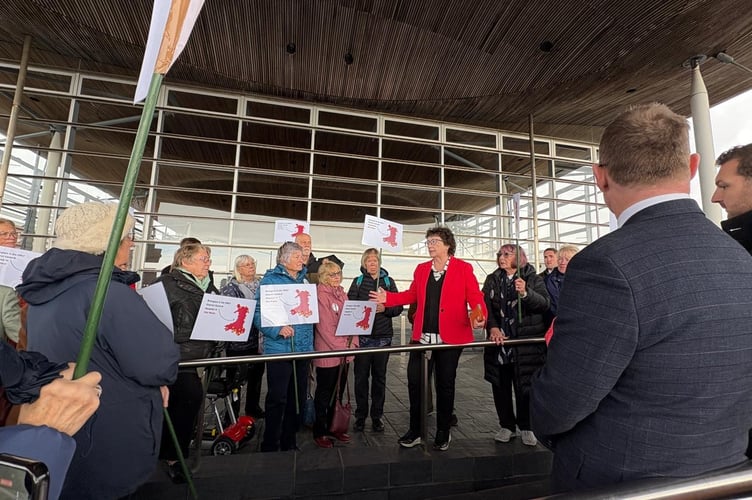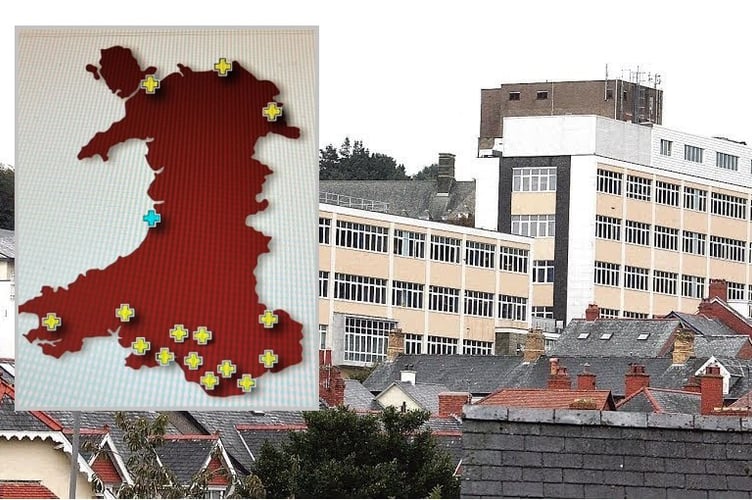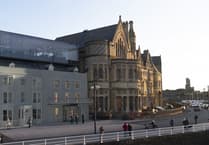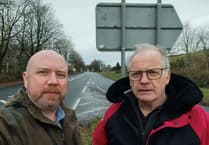Politicians in Cardiff Bay have been told that Bronglais Hospital should be viewed as a solution, not a problem as they debated proposals to downgrade stroke services at the Aberystwyth hospital.
Campaigners from across Ceredigion, Powys and Meirionnydd travelled to the Senedd on Wednesday as politicians debated calls to safeguard full stroke services at Bronglais Hospital after more than 17,000 signed one of the biggest petitions in the Senedd’s 26-year history.
Campaigners urged the Senedd and Welsh Government to intervene immediately to protect the stroke unit amid plans to downgrade the service to a “treat-and-transfer” model.
Under consultation proposals, stroke patients presenting at the Aberystwyth hospital could be transferred to the Prince Philip in Llanelli or Withybush in Haverfordwest.
Labour’s Carolyn Thomas, who chairs the Senedd’s petitions committee, said only a handful of petitions – including calls to scrap 20mph limits – have collected more signatures.

The petition, submitted by Bryony Davies from the Protect Bronglais Services campaign, warned patients face risky, long-distance transfers taking two hours if services are cut.
Leading the debate, Ms Thomas explained the Hywel Dda health board is expected to make a decision this autumn following a consultation between May and August.
She said Bronglais scored relatively well in a UK-wide assessment of stroke care services, with a ‘B’ alongside Withybush whereas Prince Philip and Glangwili received a ‘C’.
The petitioners expressed concerns about the potential implications for end-of-life care, warning stroke patients could die far away from their families.
Ms Thomas told Senedd members: “We noted the petitioners’ concerns that the role of family and friends in stroke rehabilitation is being overlooked, with distances and limited transport infrastructure making regular visits impractical.
“Using online platforms for patient communication instead is criticised as unrealistic, given stroke-related impairments and poor digital connectivity.”
Her committee has also received other petitions on the future of hospital care, raising alarm over a “crisis” at Glangwili and the loss of weekend services at Cardigan’s minor injuries unit.
Hywel Dda health board has argued the Bronglais changes are necessary to make stroke services more sustainable, with centralisation improving staff recruitment and retention.

But the petitioners pointed out that no equality impact assessment was carried out, urging the health board to “go back to the drawing board and run a truly consultative process”.
Paul Davies, the Conservative Senedd member for Preseli Pembrokeshire, backed the campaign, telling colleagues the proposals will have a “huge impact” across west Wales.
Warning patients face a round trip of 200 miles or more, he said: “Forcing us to travel further for essential and indeed vital services is totally unacceptable.”
Mr Davies pointed to a 2014 Welsh Government-commissioned study which recommended unnecessary journeys to access care should be eliminated in mid Wales. He also raised the Stroke Association’s opposition to the proposals.
He said: “To centralise these services away from Bronglais when the unit has been declared the best in the Hywel Dda health board area does not make any sense whatsoever.”
Mabon ap Gwynfor, Plaid Cymru’s shadow health secretary, stressed every minute counts in treating stroke and rehab is just as important to give patients the best chance to recover.
Mr ap Gwynfor, whose father is a stroke patient at Glangwili, said: “I have grave concerns about proposals for stroke services that I feel would lead to real harm.”
He argued Bronglais hospital is best placed to serve as a regional centre of excellence, warning sustainability must not come at the cost of access or quality.
He added: “Bronglais should be viewed as a solution, not a problem.”

Labour’s Joyce Watson, who represents Mid and West Wales, urged the health board to listen to the “immense” strength of feeling, describing the potential for patients to be isolated from their families as “distressing to say the least”.
Jane Dodds, the Welsh Liberal Democrats’ leader who also represents Mid and West Wales, warned stroke remains the fourth largest killer and a leading cause of long-term disability.
“Every minute matters,” she said. “And for people in rural Wales, those minutes can mean the difference between life and death.”
Health secretary Jeremy Miles told the Senedd: “Our aim is to reduce the risk of stroke and, when it happens, to give patients the best possible chance to survive and recover”.
Mr Miles was not convinced by the 17,883-name petition, pointing to an “emerging clinical consensus” that acute stroke care should be provided as a specialist service regionally.
Stressing it is a decision for the health board – not the Welsh Government – he said: “The services in their current configuration are not providing the best outcomes for patients, despite the efforts of NHS staff, and they are not sustainable.”
Following the debate, representatives from Protect Bronglais Services met with Jeremy Miles.
The meeting, arranged at the request of Lisa Francis and facilitated by the Llywydd, Elin Jones, was attended by PBS Lead Petitioner Bryony Davies and Dr Phil Jones, retired Bronglais Stroke Doctor and former Stroke Lead for Wales. Elin Jones also participated in the discussion.
Lisa Francis said: “The debate was extraordinarily strong, with excellent and passionate contributions from across all parties. The cross-party unity shows a clear understanding that the proposed ‘Treat and Transfer’ model is unworkable and unsafe for a rural region like ours. You cannot apply an urban system to Mid and West Wales, where travel times can often be over two hours compared to just minutes in cities.”
“The group emphasised that the plans, developed by individuals unfamiliar with the unique challenges of Mid Wales, have wasted valuable Health Board time and resources on what they described as “half-baked plans and a flawed consultation.”
Despite this, Lisa said she felt that the meeting with the Cabinet Secretary for Health and Social Services Jeremy Miles was constructive:
“Mr Miles was courteous, attentive, and genuinely engaged. He gave us forty minutes of his time and concluded by saying, ‘I’m in listening mode.’ We very much hope he will now act.”
Reflecting on past campaigns to protect Bronglais services, Lisa recalled the 2012 pro test that led to the Longley Review: “As the late Elystan Morgan said back then, ‘We cannot allow the Minister to pass the buck back to the Health Board – the Welsh Government is sovereign in these matters.’ That remains true today. The Government has the power to intervene – and it must.”
Following the debate, the Senedd Petitions Committee has written to Protect Bronglais Services to ask them to tell them what we thought of the debate and whether or not we were satisfied with the outcome.
PBS will provide feedback on that before the next Petitions Committee Meeting on the 10th November.
Lisa added: “In the longer term, we need an ongoing dialogue with the Welsh Government and Hywel Dda so that we can co-develop solutions and create a stroke service which is ‘bespoke’ to Bronglais Hospital serving Mid Wales communities.
“We are not here just to oppose proposals; we need them to find workable, safe solutions which do not endanger the lives of a mostly ageing population in a rural area where there is a poor transport infrastructure.
“The debate around this matter is not just about policy. This is about values: primarily about fairness and equity and Hywel Dda need to think very deeply about what sort of Health Board they want to be.
“Two things have happened during the last week which could make a significant difference to our cause:
“On Monday of this week, Stroke Association Cymru published a document saying that they did not agree with Hywel Dda’s proposal for a ‘Treat and Transfer’ Unit at Bronglais involving transporting stroke patients two hours away for their rehabilitation.
“The Stroke Association provides the Welsh Government with information on how to answer questions around stroke and so this new information from them was pivotal. Significantly, this document was sent to every Senedd member before the debate last Wednesday
“And the other thing is this: whilst PBS is not a political organisation – we enjoy cross-party political support and none - it would be unmindful not to mention the result of the Caerphilly by election earlier today where Labour received a catastrophic and for them, shocking and unusual result. Should this be replicated across Wales at next May’s Senedd elections, they could end up with no seats. More particularly, the First Minister who has announced her intention to stand for the new seat of Ceredigion Preseli, may not win a seat. I would suggest that public feeling is so strong, that any decisions taken around stroke services at Bronglais Hospital could be pivotal to her possible re-election.”
Ceredigion MS Elin Jones said following the debate and meeting: “I was really pleased that all the important issues supporting the need to keep full stroke services at Bronglais were raised during the Senedd debate, that I chaired. Importantly, there was also cross-party objection to the Treat and Transfer model proposed by the Health Board. Members from all parties voiced their objection – Plaid Cymru, Tories, Labour and LibDems and this was very powerful. The petition and debate have been extremely valuable in shining a light on the need to reject this proposal.
“Following the debate, I met with the Health Minister and the petitioners to discuss in more detail the many problems caused for the people of mid Wales by the Health Board’s stroke proposals. Eluned Morgan MS also joined and met the petitioners at that point.
“I’ve no doubt that the objections to the Health Board proposals for the Stroke Unit at Bronglais have been heard in all the right places. The question now is whether anyone has listened? It’s time for the Health Board to withdraw the Stroke proposals from the Clinical Servcies Review process. The time to do this is in the November Health Board meeting and not wait until Februrary. Stroke services for mid and west Wales need more meaningful planning with Swansea Bay Health Board in terms of specialist support and leadership, alongside Powys and Betsi Cadwalder Health Boards. We will need improved and increased stroke services for decades to come. That’s why a detailed, bespoke stroke service for a rural, ageing population needs to be planned.”
Mabon ap Gwynfor MS said: “We know that Hywel Dda health board is due to discuss these proposals again in February, and that gives us a vital window to make our voices heard.
“The voice of patients and their families must be at the heart of this process, particularly those who will be disproportionately affected by the proposals, such as those living in rural south Meirionnydd, Machynlleth, and beyond.
“Too often, decisions are made without truly listening to the people who rely on these services’ day in, day out.
“What’s more, the Stroke Association - the leading voice on stroke care in the UK - has come out against these plans
“When experts, patients, and communities are all raising red flags, it’s time to stop and listen. This is our opportunity to show that we will not accept a second-class service simply because we live in rural Wales. “Stroke care must be safe, specialist-led, and accessible - and that means keeping a full service at Bronglais. Ysbyty Bronglais should be seen as the solution - not the problem.
“But that requires collaboration - not just within Hywel Dda, but across health board boundaries. If there was meaningful collaboration between health boards, we could build a model of care that is both specialist-led and rooted in our communities. This is a moment to be bold and ambitious for rural healthcare - not to retreat from it.”
Montgomeryshire MS Russell George said: “It was good to meet members of the Save Bronglais Hospital campaign group outside the Senedd. It was a pleasure to address them and to ensure their voices were heard during the debate.”
“Hywel Dda health board and the Welsh Government must recognise the realities of rural access.
“I am asking the Welsh Government and the health board to scrap the relocation proposals and prioritise improvements that safeguard local access to stroke recovery services at Bronglais hospital”




Comments
This article has no comments yet. Be the first to leave a comment.